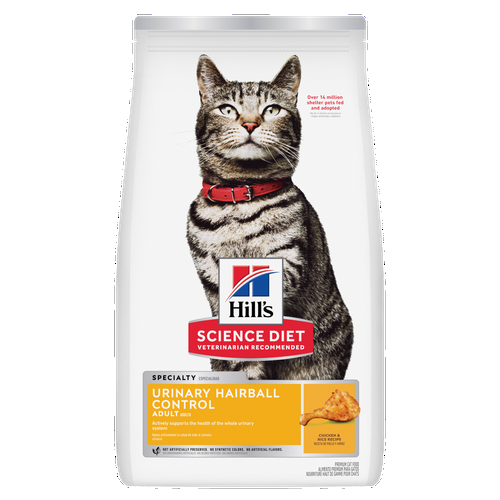
-
Find the right food for your petTake this quiz to see which food may be the best for your furry friend.Find the right food for your petTake this quiz to see which food may be the best for your furry friend.Featured products
 Adult Small & Mini Lamb Meal & Brown Rice Recipe Dog Food
Adult Small & Mini Lamb Meal & Brown Rice Recipe Dog FoodFor the faster metabolism of Small & Mini dogs
Shop Now Adult 7+ Small & Mini Chicken & Brown Rice Recipe Dog Food
Adult 7+ Small & Mini Chicken & Brown Rice Recipe Dog FoodFor the unique nutritional needs of mature Small & Mini dogs
Shop Now Hill's Science Diet Adult Oral Care Chicken, Brown Rice & Barley Recipe Dog Food
Hill's Science Diet Adult Oral Care Chicken, Brown Rice & Barley Recipe Dog FoodClinically proven kibble technology to reduce plaque & tartar build-up
Shop NowFeatured products Adult Indoor Chicken Recipe Cat Food
Adult Indoor Chicken Recipe Cat FoodSupports energy level and beautiful fur in indoor cats
Shop Now Adult Urinary Hairball Control Chicken & Rice Recipe Cat Food
Adult Urinary Hairball Control Chicken & Rice Recipe Cat FoodActively supports the health of the whole urinary system
Shop Now Hill's Science Diet Adult Sensitive Stomach & Skin Dog Food
Hill's Science Diet Adult Sensitive Stomach & Skin Dog FoodHighly digestible recipe, gentle on stomachs. Nourishes skin & promotes a lustrous coat
Shop Now -
Featured articles
 My Pet Ate a Lizard — What Should I Do?
My Pet Ate a Lizard — What Should I Do?Learn what to do if your pet eats a lizard, including whether they can be toxic and symptoms to keep an eye on when they've swallowed one.
Read More Easy DIY Dog & Cat Toys: Nine of Our Favorites
Easy DIY Dog & Cat Toys: Nine of Our FavoritesBrowse this comprehensive guide for several of our favorite DIY dog and cat toys that are sure to put a little pep in your pet's step.
Read More 15 Pet-Friendly Cities Ideal for a US Road Trip
15 Pet-Friendly Cities Ideal for a US Road TripCheck out our list of pet-friendly U.S. cities that are excellent travel options, offering off-leash dog parks and pet-friendly restaurants & hotels.
Read More -


If you have a pooch who tends toward anxiety, you may wonder if melatonin is safe for them. In fact, veterinarians prescribe melatonin for dogs to help relieve sleep disorders and mild anxiety, as well as other issues. Read on to find out how melatonin may help dogs. As always, speak with your vet before giving your pet any type of medicine or supplement.
What Is Melatonin?
In mammals, melatonin is a naturally occurring hormone in the brain's pineal gland that regulates sleep cycles, alerting the body to when it's time to sleep and wake up. Melatonin levels are highest at night and lowest during the day.
Most melatonin supplements are synthetic. However, so-called natural melatonin supplements are sourced from animals' pineal glands.
Why Is Melatonin Prescribed for Dogs?
Your vet may prescribe melatonin for your dog if they have:
- Disordered sleep
- Anxiety
- Hair loss
- Cushing's disease
Your vet might also recommend melatonin if your dog has cancer and is going through chemotherapy.
When used to treat sleep or anxiety issues, especially noise phobias triggered by things like fireworks or thunderstorms, melatonin may be prescribed in conjunction with behavior therapy and other non-drug treatments.
Can I Give My Dog Melatonin and Is It Safe?
Now that you know what melatonin can potentially do, you may wonder if you can give your dog melatonin safely? The answer is that you potentially can, but watch for negative side effects and make sure you have approval from your vet first.
The most common side effects your dog may experience from melatonin are extreme drowsiness, fatigue, digestive issues and, in some cases, an increased heart rate. Veterinary Partner says you should never give melatonin to dogs with diabetes, as it may cause insulin resistance.
Also, keep in mind that the Food and Drug Administration doesn't regulate supplements, including melatonin. This can be dangerous, as some supplements may contain xylitol, a sugar substitute that's benign for humans but toxic to dogs. Be sure to thoroughly inspect ingredient labels. In fact, it is best to only by a certain brand recommended by your vet if they suggest that melatonin might be right for your dog.
How Does Melatonin for Dogs Work?
Melatonin's efficacy depends on a few factors: your dog's health, the issue being treated and the duration of treatment.
Sleep
Melatonin supplements may help get a dog's sleep pattern back on track. This can be especially helpful for senior dogs who have cognitive issues and for blind dogs who can't see when it's nighttime or morning.


Tasty Tips
Anxiety
Melatonin also promotes calmness in anxious dogs. Researchers at the British Small Animal Veterinary Congress explain that this is because melatonin "may inhibit dopamine," the feel-good brain chemical. Too much dopamine is linked to anxiety.
Hair Loss
Experts aren't sure exactly how melatonin improves dog hair loss. Dr. Sue Paterson, a specialist in veterinary dermatology, explains for Veterinary Practice that "melatonin may work at a cellular level directly on the hair follicles" or by stimulating growth hormones.
Other Uses of Melatonin for Dogs
For dogs with cancer, melatonin helps alleviate the side effects of chemotherapy and helps promote weight gain, according to Dog Cancer Blog. This is important because chemotherapy drastically reduces appetite.
According to the College of Veterinary Medicine at the University of Tennessee, melatonin may also help dogs who have Cushing's disease, which is caused by an overproduction of the hormone cortisol, by reducing cortisol levels.
If you think your dog would benefit from melatonin, speak with your vet to see if it's right for your furry friend.


Christine O'Brien is a writer, mom, and long-time cat parent whose two Russian Blues rule the house. Her work also appears in Care.com, What to Expect, and Fit Pregnancy, where she writes about pets, pregnancy, and family life. Find and follow her on Instagram and Twitter @brovelliobrien.
Related products

Clinically proven kibble technology to reduce plaque & tartar build-up

For the unique nutritional needs of mature Small & Mini dogs

Improves everyday ability to get up & go

For the faster metabolism of Small & Mini dogs
Related articles

Learn basic steps & precautions for treating a cut on your dog, including what you can put on the cut, and when you should take them to the vet.

Your dog's coat and skin are a big part of your dog's overall health. Ensure you keep your dog's coat healthy, by following these simple tips.

Understand the role that Omega-6 and Omega-3 fatty acids play in your dog's overall health, and how you can ensure they are getting enough.

Discover how the field of dog science is giving us more and more insights into the inner workings of our furry best friends.

Put your dog on a diet without them knowing
Our low calorie formula helps you control your dog's weight. It's packed with high-quality protein for building lean muscles, and made with purposeful ingredients for a flavorful, nutritious meal. Clinically proven antioxidants, Vitamin C+E, help promote a healthy immune system.
Put your dog on a diet without them knowing
Our low calorie formula helps you control your dog's weight. It's packed with high-quality protein for building lean muscles, and made with purposeful ingredients for a flavorful, nutritious meal. Clinically proven antioxidants, Vitamin C+E, help promote a healthy immune system.


